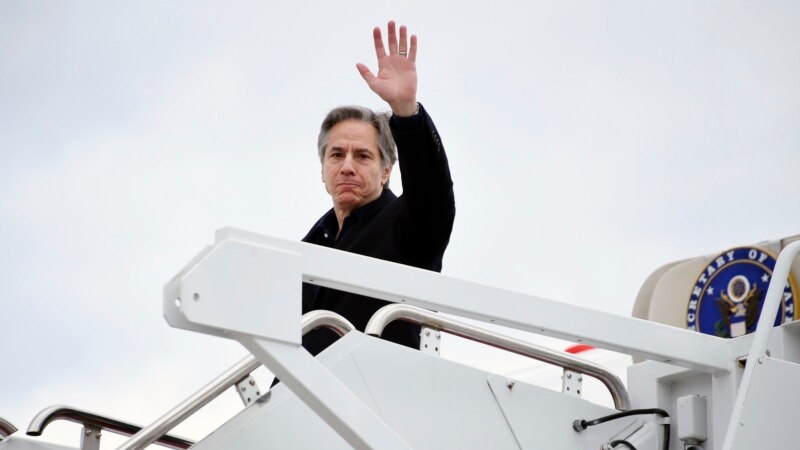
U.S. Secretary of State Antony Blinken heads to Brazil and Argentina on Tuesday morning to hold talks and foster rapport with the independent-minded leaders from the two countries while also attending the Group of 20 foreign ministers’ meetings in Rio de Janeiro.
With Russian Foreign Minister Sergey Lavrov also expected at the G20 meetings, there’s potential for a rare face-to-face interaction between the two.
Blinken’s visits to Brazil and Argentina will be his first as the top U.S. diplomat.
Blinken will meet with Brazilian President Luiz Inacio Lula da Silva in Brasilia and the newly inaugurated Argentine President Javier Milei in Buenos Aires to discuss bilateral and global issues.
The State Department said Blinken will emphasize U.S. support for Brazil’s G20 presidency, the U.S.-Brazil Partnership for Workers Rights, cooperation on the clean energy transition and commemorations for the bicentennial of diplomatic relations between the two countries.
Blinken also plans to discuss the Multinational Security Support Mission in Haiti with G20 partners on the sidelines of the meetings, addressing the Haitian people’s call for help to restore security and stability.
Argentina boasts one of the largest Jewish populations in South America. Following Milei’s recent visit to Israel, a senior U.S. official said Blinken will engage in discussions with Milei regarding “the way forward between Israel and Gaza.” Other topics high on the agenda include critical minerals and sustainable economic growth.
No G20 joint statement expected on Gaza, Ukraine
The G20, comprising 19 countries including the G7, the European Union and the African Union, represents about 85% of global GDP, 75% of global trade and two-thirds of the global population.
The G7 comprises the world’s richest and most powerful countries.
Last week, G7 foreign ministers expressed outrage over the detention death of Russian opposition leader Alexey Navalny and pledged unwavering support to Ukraine as the two-year mark of Russia’s invasion approaches.
The G7 foreign ministers’ joint statement also advocated for “prolonged and durable pauses in the hostilities leading to a sustainable cease-fire” in Gaza while expressing “deep concern” over the “devastating” impact of Israel’s planned military operations in Rafah, where more than a million civilians are taking refuge.
Ramin Toloui, assistant secretary of state for economic and business affairs, said the U.S. will underscore the damage caused by the “Kremlin’s war of aggression” and “encourage all G20 partners to redouble their calls for a just, peaceful and lasting end” to the war on Ukraine.
But Toloui said Brazil would not “attempt to mobilize a joint statement” during the upcoming G20 foreign ministers’ meetings.
Distinct foreign relations
Blinken’s diplomatic missions to Argentina and Brazil will navigate the countries’ distinct foreign relations concerning various countries and issues, such as Russia, Gaza and China.
Lula initially assured that Russian President Vladimir Putin, who faces an International Criminal Court arrest warrant, would not be arrested if he attended the G20 summit in November in Brazil. However, he later amended his stance, indicating that the decision would ultimately be in the hands of Brazil’s judiciary.
During his visit to Cairo, February 14 and 15, Lula strongly criticized Israel’s military actions in Gaza, advocating for a “definitive cease-fire.” He announced Brazil’s new contribution to the United Nations’ Palestinian refugee agency, or UNRWA, and supported Palestine’s recognition as a sovereign state with full U.N. membership.
Lula wrote on the social media platform X, “While Hamas militants’ attack on October 7 against Israeli civilians is indefensible and deserved strong condemnation from Brazil, Israel’s disproportionate and indiscriminate response is unacceptable.”
In contrast, during his visit to Israel in early February, Milei, a pro-Israel far-right leader, announced his intention to relocate Argentina’s embassy from Tel Aviv to Jerusalem, a move previously made by only the United States and a few other countries.
Milei also announced his government’s intention to classify Hamas as a terrorist organization.
This visit marked his first bilateral trip since his inauguration in December.
Following his meeting with Blinken on Friday, Milei plans to visit Washington and speak at the Conservative Political Action Conference, or CPAC, on February 24, a gathering expected to be filled with supporters of former U.S. President Donald Trump.
BRICS and China
In 2025, Brazil will lead the BRICS group (Brazil, Russia, India, China, South Africa) of emerging nations, in which China is a key player. During a state visit to Beijing last year, Lula called for BRICS countries to trade in their own currencies and end the U.S. dollar’s trade dominance. Saudi Arabia, Egypt, Ethiopia, Iran and the United Arab Emirates officially joined the bloc on January 1.
Last month, Lula held talks with Chinese Foreign Minister Wang Yi in which the two pledged to strengthen a comprehensive strategic partnership between the two countries.
In comparison, Milei has turned down an offer to join BRICS. During his presidential campaign, he said he would freeze relations with China.
Milei also chose to acquire secondhand American F-16 fighters from Denmark, favoring them over new Chinese JF-17 fighter aircraft.
“The United States is the largest source of foreign direct investment in Brazil, and we have a robust presence of U.S. companies in Brazil, as well as in Argentina, and we’re looking forward to deepening our economic ties between both of them,” Brian Nichols, the assistant secretary of state for Western Hemisphere affairs, told VOA in a recent phone briefing.
Nichols emphasized the importance of countries trading freely while understanding the trade-offs involved.
“The United States is offering up a comprehensive and powerful alternative to those who may not necessarily have others’ best interests at heart,” he said.
